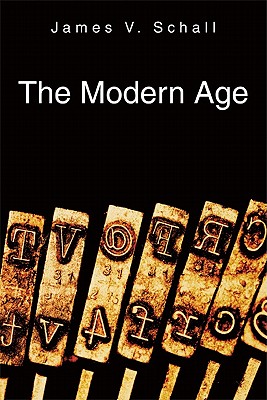The thesis that modern ideologies are a secular replacement for transcendent religions is old hat even to the half-educated in Western society. (The phrase “immanentizing the eschaton” was coined by Eric Voegelin and popularized by William Buckley in the 60’s.) And so a cursory glance at James Schall’s book suggests that the author is simply recycling familiar ideas, now become historical-philosophical platitudes.
But that is not the case. Schall views his subject from an original perspective that adds both freshness and dimension to his argument that God’s plan for the salvation of man as announced by revelation, and modern man’s plan to save himself through an historical project of self-realization, have a great deal in common. “Modernity,” Schall says, “is essentially an alternate plan of redemption, an alternate version of the last things.” Being a purely rationalist program, however, based on the rejection of revelation and the conviction that man is in need of nothing beyond himself and his own reason to accomplish his aim, it “not only cannot achieve what it proposes, but, in its proposing, skewers and corrupts what politics and human living can be.”
Schall’s book was inspired by Benedict XVI’s encyclical Spe salvi, which he calls “a document of great profundity.” In his opinion, personal and public disorders can be traced to faulty thinking, usually that of “some ‘thinker’ recognized as great. The great battles of the world take place first in the sometimes quiet, sometimes acrimonious discussions of the philosophers seeking to relate to what is.” In the modern age, the belief that there is no truth beyond the “truth” of our own making has led inexorably to the replacement of reality by mind—what John Lukacs calls “abstraction.”
Benedict says that politics must be restored as politics—that is, to the prudential practice and application of ethics to public affairs. And the reason why politics is no longer politics, Schall explains, has to do with the modern age’s confused understanding of art as it relates to prudence, and of both in their relationship to metaphysics. Owing to this confusion, our age is “a quasi-artistic human creation” intended to counter and replace the traditional response to reality indicated by classical philosophy and revelation.
While art and prudence are both aspects of practical reason, they are not one and the same thing, nor are they interchangeable. Art is properly concerned with the things produced by the human world; prudence, with those with which the natural world confronts us. Art springs from will, and reason from prudence. “Understanding the modern age, then, includes understanding what has become of political regimes that embody as their justification the will and not reason as their foundation”—an assertion of human will and logic that Schall traces from Machiavelli, whom he credits with having established the standard for the new political “art.” The artist has license to present a new image of man, so long as it is not degraded man. But the prudential man of affairs is never justified in making or remaking the template that determines what it is to be a human being. Hence,
by considering politics an art rather than a prudence designed to achieve a known good through habit and experience, we are said to be free to define “rights” and “goods” however we want. We can do [sic] this redefinition through the narrow use of an instrumental reason. We do not ask about our ends as human beings who transcend this world. We rather ask reason to achieve what it is we think we want, now defined as “reasonable,” in this world.
Quite logically, therefore, issues relating to human life and its meaning are central to the modern project: abortion, euthanasia, contraception, conception outside the womb, cloning, stem-cell research, gay “marriage,” “eternal” life attained through the indefinite extension of longevity.
“Modern man confuses happiness with salvation when he sees himself as the cause and source of both.” This accounts for the contemporary fervency of political life, a fervency that properly belongs to the sphere of religion. Yet it needs to be pointed out, as James Schall does, that salvation on these terms, and achieved by these means, is reserved for the happy few: those few who merely happen to be walking around when the earthly paradise their ancestors strove to create has finally been achieved. As for those countless generations that came before them, they are the unhappy and untold myriad who had the bad luck to be born before the time of humanity’s coming of age: humble, underdeveloped laborers and laboratory subjects subordinated to the project of a human self-perfection they were not around to realize for themselves. Life’s not fair, as the saying goes.
According to Socratic principle, it is never right to do wrong. But a system of law lacking a divine component is one definition of modernity, Schall suggests. That is why Benedict emphasizes that politics is primarily a moral, not an eschatological, enterprise.
I must add, in closing, that the author’s Appendix I, “One Hundred Years of Orthodoxy,” is the best comprehensive essay on G.K. Chesterton that I have ever read.
[The Modern Age, by James V. Schall (South Bend: St. Augustine’s Press) 207 pp., $30.00]

Leave a Reply